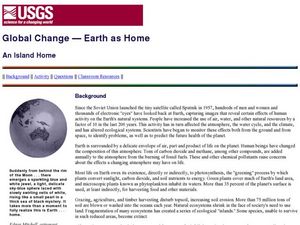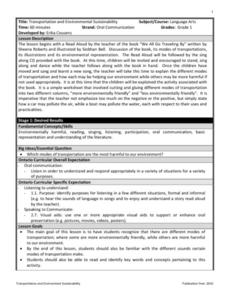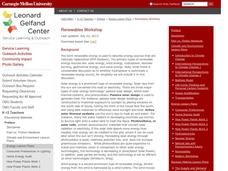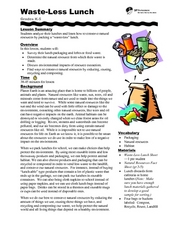Curated OER
Clean, Green Power
Students explore and discuss alternative energy sources, and identify disadvantages of current fossil fuels.
Curated OER
Our Environment
Students examine the world's environmental dilemmas and create project depicting how to improve the environment. They study ten endangered species.
Curated OER
Global Change- Earth as Home
Students create their own environment. For this environmental protection lesson, students pretend they are the owners of a tropical island. They create jobs for the citizens and develop the island as a model environment.
Curated OER
Where in the World? Biomes of the Earth
Learners research a biome. In this biomes of the Earth lesson, students discuss what they already know about ecology and view pictures of different biomes. Learners work in groups to research a different biome. Students use the...
Curated OER
Wind Power! 2
Fourth graders explore how engineers transform wind energy into electrical energy by building their own miniature wind turbines and measuring the electrical current it produces. They see how design and position affect the electrical...
Curated OER
SAVE OUR EARTH
Students research current environmental problems in order to develop and deliver an oral presentation. The presentation persuades the audience to act on the student's point of view on the issue.
Teach Engineering
You've Got to See it to Believe It!
Youngsters develop an understanding of how smog is produced, and how exhaust from automobiles is one of the major sources of smog. They explore the roles that engineers play in developing technologies that reduce smog, then work in teams...
Curated OER
Transportation and Environmental Sustainability
After listening to the book, We All Go Traveling By, 1st graders discuss different modes of transportation that they see out in the world, and the environmental impacts of each one. Kids work together to create a list of the types of...
Curated OER
Science-Observation Skill Builders
Pupils explore observation while making connections between observation skills and careers (like how farmers observe the weather). They view a variety of nature photographs on the computer and practice their observation skills by...
Carnegie Mellon University
Understanding Electricity Mix Tradeoffs
Use the accompanying presentation and colorful technology sheets to introduce your class to the 10 different energy technologies. Connect kids to an interactive computer tool that allows them to combine different types of power...
National Wildlife Federation
Quantifying Land Changes Over Time in Areas of Deforestation and Urbanization
Is qualitative or quantitative research more convincing when it comes to climate change? In the eighth lesson during this 21-part series, scholars begin by performing a quantitative analysis of deforestation and urbanization. Then, they...
Curated OER
Change Since 1609
Students recognize how the climate of the Hudson Valley has changed since the last glaciation. They explain these changes using a reconstruction of the land use changes in the Hudson Valley composed of confetti, Ziploc bags and other...
Curated OER
Paleoclimate of the Hudson Valley
Students recognize how the climate of the Hudson Valley has changed since the last glaciation and be able to explain these changes. They reconstruct the paleoclimate of the Hudson Valley.
Curated OER
Transportation and Environment
Young scholars make an eco-friendly vehicle to help make transportation better for the environment. In this transportation lesson, students learn how transportation inventions are bad for the environment. They then see how engineers have...
Japan Society
Nature and the Environment in Postwar Japan
Japan has a complex relationship with the environment. Explore this relationship with your class through this resource. Included are thought questions, several activity ideas that range from writing, to discussion, to research, and an...
Carnegie Mellon University
Renewables Workshop
Youngsters examine resource maps to find out which states are using solar and wind power and discuss as a class various other renewable energy sources. They use a provided data table to record pros and cons to each technology, build and...
Curated OER
Don't Let the Earth Down
Writing a persuasive argument starts with a clear thesis. Using this resource, your class will write a persuasive paper on a conservation issue. They will then transform their argument into a 30-second public service announcement. If...
Curated OER
Don't Let the Earth Down
Although recycling is definitely beneficial, reducing our waste and conserving our natural resources should really be the focus of environmentalists. Encourage the future generation to create a public service announcement about a...
Chymist
Landfills and Recycling
Examine the nature of landfills through experimentation. Scholars build miniature landfills and monitor changes over a six-week period. Observations allow individuals to draw conclusions about the different types of trash and their...
SF Environment
Waste-Less Lunch
Is it possible to have a waste-less lunch? Can your class become leaders in conservation? Discuss the importance of reducing waste during lunch time with a fun lesson that can be extended to everyday practices. First the class examines...
Curated OER
Acid Rain: The Disappearing Statue
Second graders examine the effects of acid rain on statues and buildings. They participate in an experiment in which they use different chemicals on building materials. They observe and record their observations.
Curated OER
Harmful Effects of Acid Rain
Students participate in an experiment to become aware of the harmful effects of an acidic solution -- acid rain.
Curated OER
Using Maps To Make Public Health Decisions Case Study: Wildfires in Mexico 2000
Students study environmental health. Using actual NOAA satellite imagery, students investigate the basic concepts of mapping. They explore the relationship between monitoring satellite images and public health decision making.
Curated OER
Oil Spill
Fourth graders watch a video about the types of products made from oil or oil used as energy to produce the product. In groups, they identify the positive and negative aspects of oil and participate in various activities. They use the...
Other popular searches
- Water and Air Pollution
- Water, Air Noise Pollution
- Water Land Air Pollutants
- Water and Air Pollutants
- Water Air Noise Pollution
- Land Air and Water Pollution
- Pollution of Air and Water

























